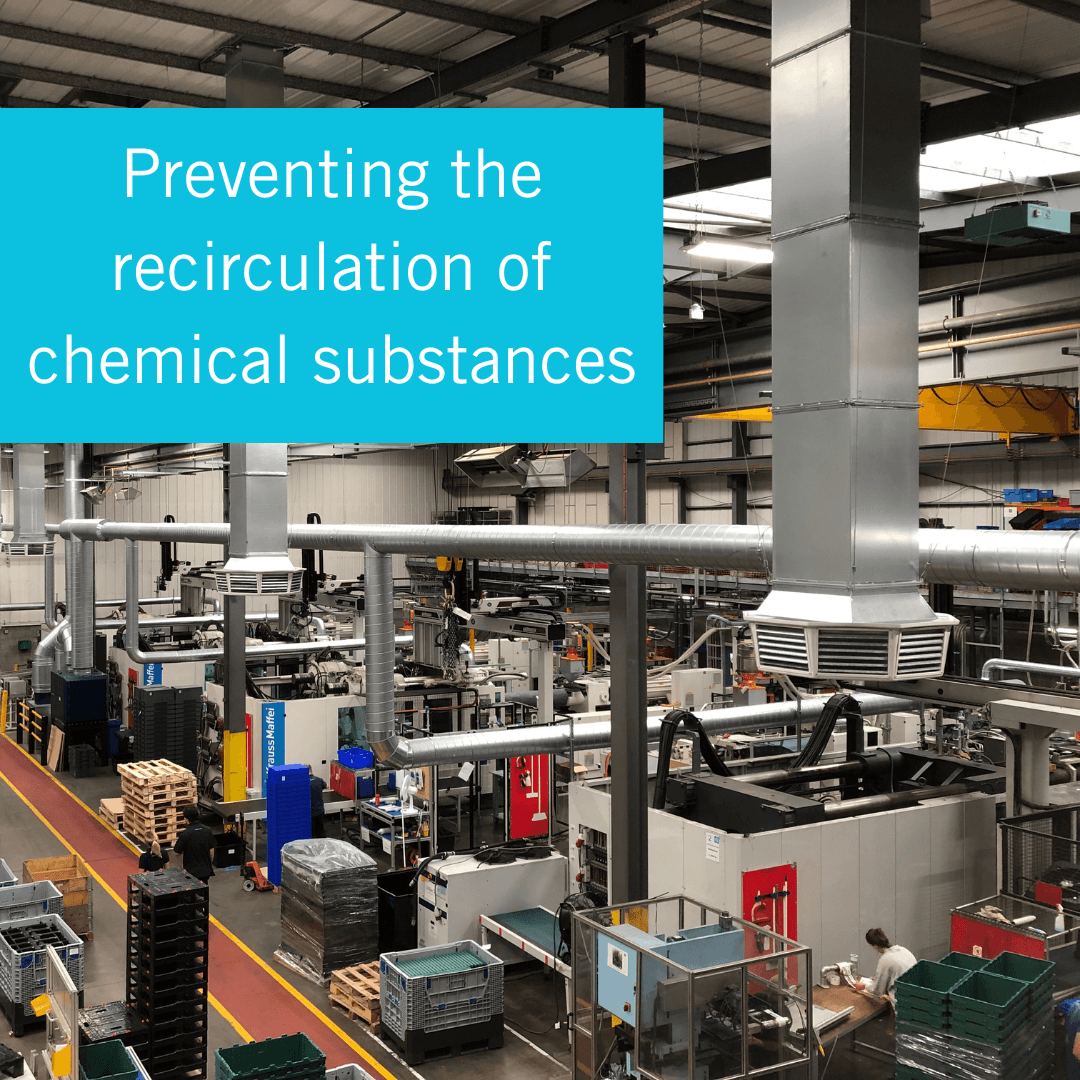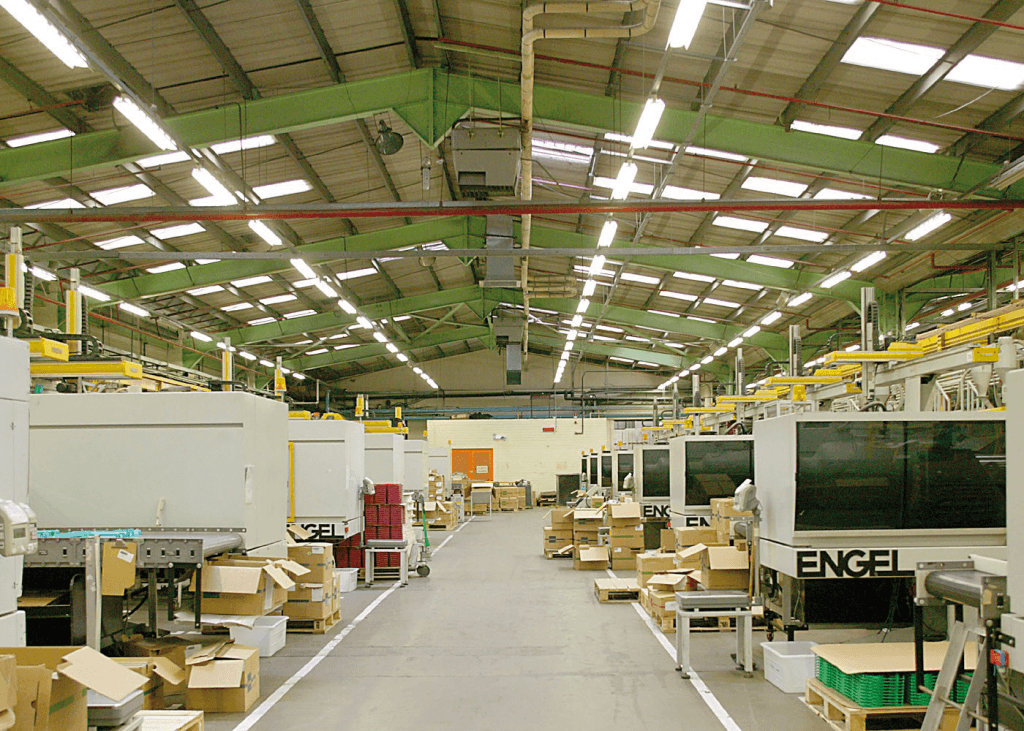Plastic industry cooling with Seeley International solutions
Evaporative cooling is the best option when high heat levels or chemical usage negatively impact Indoor Air Quality.
Plastic industry cooling
Seeley International’s advanced cooling units are specifically designed for the plastics industry, offering a sustainable and effective way to control temperature and humidity in manufacturing and storage areas. These systems deliver precise environmental control, ensuring product quality while reducing energy consumption and minimizing pollutants level inside the manufacturing area.
Effectively, plastic production often involves chemicals that release toxic fumes, compromising Indoor Air Quality (IAQ) and wasting valuable airflow. Installing a fixed evaporative cooling solution creates a controlled environment that stabilizes production, preserves product integrity, and improves IAQ. By continuously supplying 100% fresh air, these systems help eliminate harmful chemicals and substances, enhancing the health and comfort of your workspace.
Beyond improving efficiency, evaporative cooling delivers long-term cost savings. With a focus on energy efficiency and sustainability, it lowers energy bills, enhances product quality, reduces your environmental footprint, and ensures a safer, cleaner working environment.
Discover how Seeley International’s innovative cooling technology can optimize production processes, improve product quality, and support a more sustainable business model.
Energy efficient
Cost saving A/C solution
Ideal for plastic processing environments
Improved Indoor Air Quality (IAQ)
Sustainable solution
High scalability

Benefits for Plastic industry Cooling
Better Air Quality: The system consistently provides fresh air and controls humidity levels, maintaining ideal conditions for plastic manufacturing and storage. It helps eliminate odors, airborne pollutants, and prevents the buildup of chemical substances. The continuous airflow enhances Indoor Air Quality and creates a better work environment for employees.
Energy Efficiency: Reduces energy consumption and utility costs compared to traditional cooling systems, making it a cost-effective choice for plastic manufacturers.
Cost-Effective: Requires minimal maintenance and operates at a low cost, ensuring optimal Indoor Air Quality (IAQ) while effectively managing chemical substances.
Eco-Friendly: Utilizes water and natural airflow to cool the space, reducing environmental impact and supporting your business’s sustainability goals.
Enhanced Product Quality: By regulating temperature and humidity consistently, the system helps maintain the quality of your plastic products, enhances the production process, and ensures a comfortable and productive environment for your staff.
Seeley International’s evaporative cooling provide precise temperature and humidity control that protects product quality, eliminates harmful fumes, and ensures a safer, healthier workspace — the perfect solution for plastic manufacturing industries.
Harness the power of Evaporative cooling
Hasbro Ireland installed Breezair Evaporative Cooling in its 23,000-square-meter factory to address high temperatures in the plastic injection moulding workshop. The Breezair coolers reduced temperatures from 30°C to a comfortable 23°C, significantly improving working conditions and boosting productivity. Before the installation, poor thermal conditions in the workshop, worsened by 36 moulding machines, led to worker fatigue and low morale. The success of the system led to the installation of additional coolers in other high-temperature areas of the factory. The result has been a dramatic reduction in complaints, improved morale, and a more comfortable, productive work environment.
Evaporative Cooling Applications
Evaporative air conditioning has a wide range of cooling applications
Evaporative cooling is a highly effective solution for the plastics industry, where precise control of temperature and humidity is essential for maintaining product quality and boosting production efficiency.
By supplying 100% fresh, filtered air, this system improves ventilation while reducing CO₂ and VOC levels. It regulates both temperature and humidity to create an ideal environment for manufacturing and storing plastics — protecting product integrity and providing a comfortable, productive workspace for employees without the recirculation of chemical substances inside the building.
Click on each application below to explore the unique benefits for every scenario!
Evaporative cooling offers an energy-smart and budget-friendly alternative for maintaining optimal temperatures in plastic manufacturing plants, warehouses, and large production environments. Consuming up to 80% less energy than traditional refrigerated systems, it’s the perfect choice for facilities with frequent door openings, where conventional air conditioning struggles to perform efficiently.
Designed for demanding industrial conditions, this system delivers powerful, consistent cooling while promoting a healthier indoor environment. By introducing a continuous stream of 100% fresh, filtered air, it enhances ventilation, removes dust, odors, and pollutants, and reduces CO₂ and VOC levels.
Evaporative cooling also helps regulate humidity levels, adding natural moisture to prevent dryness and minimize static electricity — critical factors in plastic processing and storage. The result is a safer, cleaner, and more comfortable environment that supports employee well-being, improves air quality, and enhances productivity and product quality across the plastics, textiles, and pharmaceutical industries.
Contact an HVAC Sales Engineer
Speak to one of our HVAC experts about your project requirements...
Industrial air conditioning unit Frequently Asked Questions
- Evaporative air conditioners (coolers) are excellent for health
- They supply 100% fresh, filtered air into your building that is not recirculated, improving Indoor Air Quality (IAQ) of the space, supporting customer and staff well-being
- They remove unhealthy pollution from your indoor environment
- They provide basic moisture that the human body needs
- They remove static electricity; they can assist in reducing the effects of illnesses such as asthma.
A high inlet water temperature does not have a marked effect on the supply temperature of Seeley International’s evaporative air conditioners.
Yes. Outdoor areas have no walls to contain the cool air. These spaces would be impossible to cool using refrigerated air conditioning because this relies on recirculating and reusing air from a sealed area. Evaporative air conditioners (coolers) can easily supply a flow of fresh and cool air to open and semi open areas since the air is exhausted naturally.
In most cases evaporative air conditioners (coolers) marginally increase humidity, keeping in mind that temperature has also dropped significantly. It is the combination of temperature, humidity and airflow that creates human comfort and evaporative air conditioners are used widely around the world because they can create comfortable conditions. For example, 80% humidity and 30°C (86°F) is very uncomfortable, but 80% humidity and 16°C (61°F) is very comfortable. Comfort is also improved by increasing air velocity in hot conditions and evaporative air conditioners create sufficient air movement to minimise the effects of humidity.
Air inside the building collects heat, moisture and impurities and must be exhausted. The evaporative air conditioner (cooler) provides 100% outside air which must be relieved from the building. If the building is sealed, the effectiveness of the cooler(s) will be reduced. Mechanical extraction or even just leaving some doors or windows open helps remove unhealthy air from the indoor environment by supplying 100% fresh, filtered air. For this reason, evaporative air conditioners (coolers) are much healthier than refrigerated air conditioning.
View more Frequently Asked Questions here.
Plastic industry cooling with evaporative cooling system
From small production facilities to large manufacturing plants, Seeley International evaporative coolers are designed to meet the diverse cooling needs of specific industries, such as the plastic and textile industries, where chemical substances are processed and handled.
